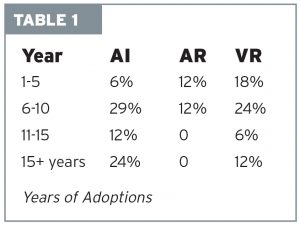The Value of Training Technology
TECH SURVEY – Nicole Wang
When considering adopting technologies, it is crucial to keep asking ‘why.’
A year ago, our curiosity about how technologies might foster innovation in life sciences prompted a research study designed to better understand the current state of and potential changes to life sciences training. Fifty-seven LTEN members participated in the survey and 10 people took part in followup interviews, producing multiple findings.
For example, while roleplay activities were ranked as the most cost-effective approach among professionals who had used it, it was also ranked as one of the least satisfying approaches. To better understand such counterintuitive results, and to determine whether emerging technologies might help solve some of the problems, a new study was designed to harvest the perspective of experts across different fields about three promising approaches: artificial intelligence (AI), augmented reality (AR), and virtual reality (VR).
The study employed a qualitative case study approach with 18 questions covering three compelling aspects of the teaching and learning process: activity and engagement, learning experiences and proficiency and impact. The interviews ranged from 30 minutes to an hour, and each interview was transcribed and analyzed to generate themes based on similarities in the interview data. Seventeen experts participated in the interview.
 Among the participants, 36 percent were at specialist level, 25 percent were directors, 25 percent were full professors and 14 percent were executives. Twenty percent were employed by consulting firms, 13 percent were working for companies in our field, 20 percent were working at medical schools in higher education, 20 percent were working in teacher education programs in higher education, 20 percent were working in instructional design roles in higher education and seven percent were working for non-profit organizations. In terms of the tools adopted, 65 percent had adopted VR, 59 percent had adopted AI, 24 percent had adopted AR and 12 percent had adopted XR. Table 1 shows years of adoption.
Among the participants, 36 percent were at specialist level, 25 percent were directors, 25 percent were full professors and 14 percent were executives. Twenty percent were employed by consulting firms, 13 percent were working for companies in our field, 20 percent were working at medical schools in higher education, 20 percent were working in teacher education programs in higher education, 20 percent were working in instructional design roles in higher education and seven percent were working for non-profit organizations. In terms of the tools adopted, 65 percent had adopted VR, 59 percent had adopted AI, 24 percent had adopted AR and 12 percent had adopted XR. Table 1 shows years of adoption.
When considering adopting technologies, it is crucial to keep asking “why” as well as questions like: “What problems are we trying to solve” and “Which technologies offer cost-effective solutions to these problems.” We, as learning designers, should not try to change the curriculum to fit a new technology just because it is the trend or the technology looks great.
In addition, it is wise and perhaps even crucial to talk to community members who have adopted the technologies. They have gone through similar learning experiences when adopting the technology, and their advice can be substantial, perhaps saving time and resources, and revealing strategies helpful in facilitating adoption.
 Emerging technologies will be able to solve some of the problems we are facing in teaching and learning. We also believe that creating on-going dialogue and research will help the life sciences learning community understand and address these complex issues in order to take advantage of the opportunities offered by the changing paradigm of technology in learning.
Emerging technologies will be able to solve some of the problems we are facing in teaching and learning. We also believe that creating on-going dialogue and research will help the life sciences learning community understand and address these complex issues in order to take advantage of the opportunities offered by the changing paradigm of technology in learning.
If you are interested in learning more, have questions, or would like to provide feedback, please feel free to reach out to us directly and we will set up time with you. This research effort is on behalf of and for the LTEN membership; your dialog is crucial to this project’s progression. We look forward to hearing from you.
Nicole Wang is a Ph.D. candidate at the Pennsylvania State University. Email Nicole at nicolewang12@gmail.com.
Join the Conversation!
Nicole Wang hosts a Future of Learning Technology discussion forum on the LTEN On-the-Go app. To join the sharing in the app, click on the “More” link at the bottom, select Forum and join the conversation!
Download the app: www.L-TEN.org/app








